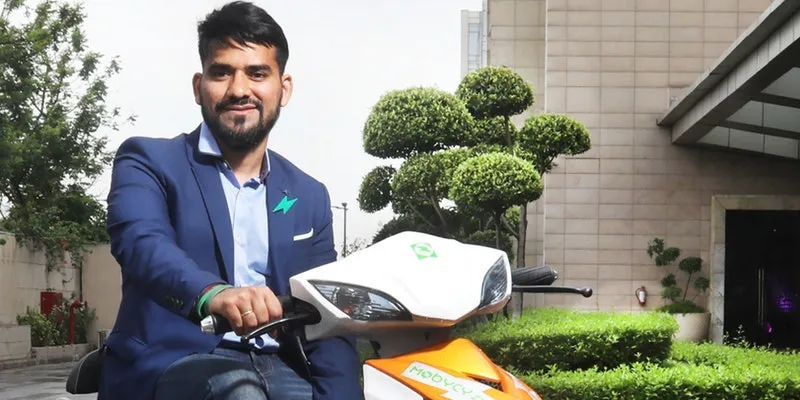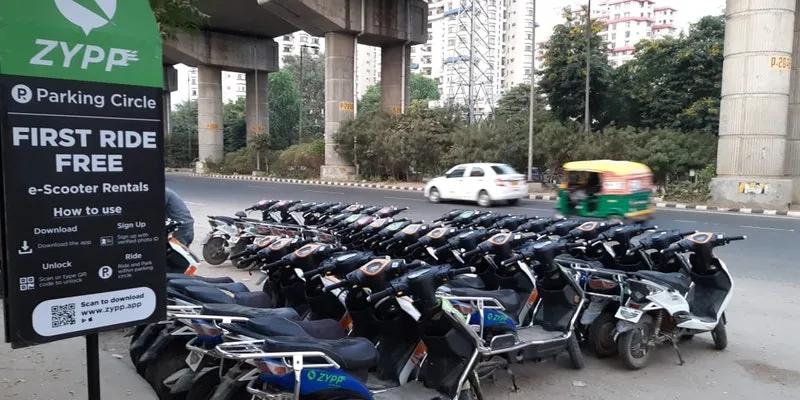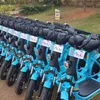Zypp eyes Rs 100 Cr funding, to expand services to six more cities
Zypp was established in August 2017 by Akash Gupta, Shivraj Singh, and Rashi Agarwal. It offers last-mile mobility and electric scooter rental services to individuals and businesses.
, an electric vehicle startup based in Gurugram, is eyeing rapid expansion with a ten-time increase in its product offering by March 2021. The company, at present, has 1,500 electric scooters on offer and it wishes to increase it to 15,000 by the end of the next financial year.
Initially, the company focussed on the B2C business and deployed its products at metro stations. This year though, Zypp shifted its focus to the B2B sector. It leases electric scooters to e-commerce establishments.
Akash Gupta, Founder and CEO of Zypp, speaks to AutoStory, explaining the business process, the art of making it sustainable, the impact of coronavirus pandemic, and future plans.
Business Model
Zypp has focussed primarily on last-mile connectivity, both as a transportation solution for individuals, as well as a last-mile delivery solution for the e-commerce platform. Akash confirmed that 75 percent of the business comes from e-commerce related deliveries.

Akash says, “Our customers are actively involved in food, groceries, and medicine deliveries. We are working very closely with brands like , , , and to help them go electric.”
The startup is also in contact with Amazon, as well as smaller retailers, in order to make their business more sustainable and carbon neutral.
Akash also highlighted that riders get to save money while using electric scooters for deliveries. He said, “While using a petrol-powered motorcycle or scooter, on an average, riders spend about Rs 325 to Rs 350 on fuel and maintenance every day. Zypp offers them easy weekly and monthly plans which bring their operational costs down to just Rs 125 a day.”
Zypp offers three form factor electric scooters. These include one which is specially designed for grocery deliveries, with racks built on the scooter, so that they can carry loads easily. A double-battery option is also on offer which helps the range to be doubled to 140 km.
For the bike taxi segment, Zypp offers a full-bodied scooter with swappable battery segment with a range of 75 km. The third form factor offered by the startup includes high-speed scooter which has a top speed of 50 km and a range of 110 km on a single charge.
The company allows individual investors to invest in the business by putting in the upfront cost of acquiring the electric scooter. Zypp then pays the investor a fixed amount of money every month.
Battery swapping and eco-friendly charging

The Indian government’s rapid push towards electrification may seem over-ambitious considering the lack of charging infrastructure. Zypp is trying to beat this with battery swapping. Customers can get a fully-charged battery for their Zypp scooter in exchange for the discharged battery and a payment of Rs 25.
Akash adds, “We started building battery swapping stations in January 2020 and have 30 such touchpoints in Delhi-NCR of which 20 are in Gurugram. The locations of these stations were selected after consultation with our key customers (delivery boys) who can easily drop by for a swap when out for making deliveries.”
The startup also intends to go solar for these swapping stations in future and will set up a task force once the number of stations scales up beyond a point.
Battery disposal
Lithium-ion batteries pose a significant risk to the environment. If damaged, not only do they stand a chance of catching fire (lithium is one of the most reactive metals known to mankind), but also carry the risk of releasing toxic gases. That’s not all. Lithium is a finite resource, which like oil, is available only in a limited quantity on the planet. Besides, extraction of the metal can lead to water pollution and other severe environmental consequences.
India has missed the bus on a scrappage policy for internal combustion engine vehicles, but the need of the hour is to have a well-defined battery recycle and disposal policy for lithium-ion batteries. While that may still take some time, Zypp has decided to make things green by giving the used batteries a second life.
“Lithium-ion batteries tend to give a reduced performance after a three-year use, approximately 60 percent of its original performance. We have tied up with third-party recyclers who remodel the battery cell to power telecom towers or streetlights.”
The impact of COVID-19 pandemic
Zypp is closely working with authorities to ensure that riders using the scooters get curfew passes. The company is also sanitising the scooters regularly, as well as educating users about the necessary safety precautions.

A lot of its users are also stuck with weekly or monthly plans and are no longer able to use their scooters because of the lockdown. Akash confirms that the company will be supporting its customers in this time of need.
He added, “Zypp has received several queries from customers who have taken a monthly plan and have, since the lockdown, been unable to use them. We are offering them cashbacks and discounts.”
The company also home-delivered 50 scooters to customers last week. Akash added, “We have started delivering scooters to individuals at their place of residence. This gives them a means of transport to go to nearby shops to buy essential commodities like groceries and medicines.”
The road ahead
Zypp raised a Pre-Series A funding of Rs 15 crore in November 2019 and used it to restructure the business and in pivoting it towards B2B services. Akash said, “We currently have 1,500 scooters in our fleet. By March next year, we plan to have 15,000 scooters across six to seven cities. At present we are operational in Delhi-NCR and Bengaluru. We will go deeper into these cities and in the second half, enter Mumbai, Pune, Hyderabad, and Chennai.”
Over the next three to six months, the company aims to finish its Series-A funding. Akash added, “We are looking to raise Rs 100 crore. This will be used to make the expansion plan a reality. I want Zypp to evolve as a stronger technology-backed platform. Besides, we will also be increasing the number of battery swapping stations.”
Big retailers and e-commerce platforms are home delivery based businesses and small brick-and-mortar single outlet businesses are also opening up to the idea. Zypp wants to tap such businesses on a priority.
Akash adds, “We are aggressively working with semi-organised and unorganised players. Be it a basic grocery store or a high-end luxury dog spa, the idea is to offer them customised plans. Currently, we have started working with , and . In the near future, this segment has the potential to be as high as 50 percent of the business for Zypp.”
(Edited by Javed Gaihlot)





![[Funding alert] Hero MotoCorp’s Pawan Munjal invests $1M in Ola Electric in Series B round](https://images.yourstory.com/cs/54/9aed5fa0c8be11e9a36aeb06ee850db6/Imagem0ji-1584006561762.jpg?fm=png&auto=format&h=100&w=100&crop=entropy&fit=crop)




